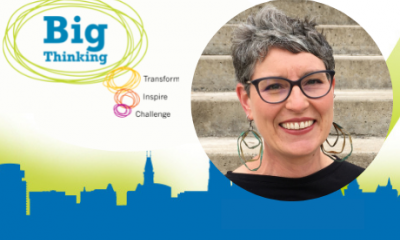VANCOUVER, June 3, 2019 — Trump, online voting, and white nationalism are all on the political agenda this week as the Congress of the Humanities and Social Sciences gets underway at the University of British Columbia. Canada’s largest academic gathering, Congress brings 8,000 of the country’s brightest researchers, thinkers, and policy-makers to Vancouver from June 1-7.
Over 5,000 pieces of research are being presented on a wide range of topics. Some of the hot-button political issues being explored include:
- Trust, Trump, and the Future of the Canada-US Security Community
The election of Donald Trump was a seismic shift in Canadian-American relations. This paper explores the implications for the trust and cooperation that have existed between the two countries for two centuries.
June 4 — 8:45 - 10:15 am
- There’s a Party at City Hall: Political Parties and Candidate Diversity in Canadian Municipal Elections
Do cities with political parties increase the electoral presence of women, visible minorities, and people from queer and Indigenous communities? Based on a survey of over 3,200 candidates in BC and Ontario, this work analyzes the role of parties on representation.
June 4 — 8:45 - 10:15 am
- The New Urbanism: Transformation of Vancouver Municipal Politics in the 2018 Election
Among the most notable developments of the 2018 Vancouver election was the rise of a new urbanist-conservationist axis, a new dimension of politics that is not reducible to the left-right axis.
June 4 — 8:45 - 10:15 am
- Tweet to Follow, Tweet to Lead: Social Media Portrayal of Leadership Styles Among Canadian Mayors
How do elected officials use Twitter and how does that impact their engagement with the public? Tweets and retweets of about 20 mayors of Canadian cities have been analyzed based on the ability of each mayor to lead and to follow.
June 4 — 8:45 - 10:15 am
- Newspaper Endorsements, News Consumption, and Vote Choice: The Case of the 2015 Canadian Federal Election
Are a newspapers’ readers more likely to vote for the party it endorses? 2015 data suggests yes, with Toronto Star readers in particular being almost 50% more likely to vote for the Liberal Party in 2015.
June 4 — 1:30 - 3:00 pm
Congress is an annual gathering of over 70 scholarly associations, each holding their annual conference under one umbrella. This year’s theme is “Circles of Conversation,” reflecting the need for dialogue, debate, and dissent within and across disciplines.
Congress is organized by the Federation for the Humanities and Social Sciences, which promotes research and teaching for the advancement of an inclusive, democratic and prosperous society. With a membership now comprising over 160 universities, colleges and scholarly associations, the Federation represents a diverse community of 91,000 researchers and graduate students across Canada. Congress 2019 is hosted by The University of British Columbia.
The Congress 2019 media kit can be downloaded here. More information about Congress is available on their website, Twitter and Facebook.
-30-
For interview requests
Federation for the Humanities and Social Sciences
Nicola Katz
Manager of Communications
nkatz@ideas-idees.ca
Cell: 613-282-3489
University of British Columbia
Erik Rolfsen
Media Relations Specialist
erik.rolfsen@ubc.ca
Cell: 604-209-3048

Democracy in the classroom: Struggles for mental equilibrium, trust and knowledge
Recent events in the United States are a stark reminder of how currents of racist hatred and thinking can lurk, concealed in the privacy of people’s thoughts until called-upon or provoked. There are folks who maybe had the misfortune of being raised...

Care is on the ballot: Why COVID-19 should push American voters to pay greater attention to the care economy

Federation for the Humanities and Social Sciences deeply concerned by U.S. executive order on immigration and refugees
OTTAWA, January 30, 2017 — The Federation for the Humanities and Social Sciences, on behalf of Canada’s 91,000 faculty and graduate students in the humanities and social sciences, expresses its grave concern about U.S. President Donald Trump’s...
